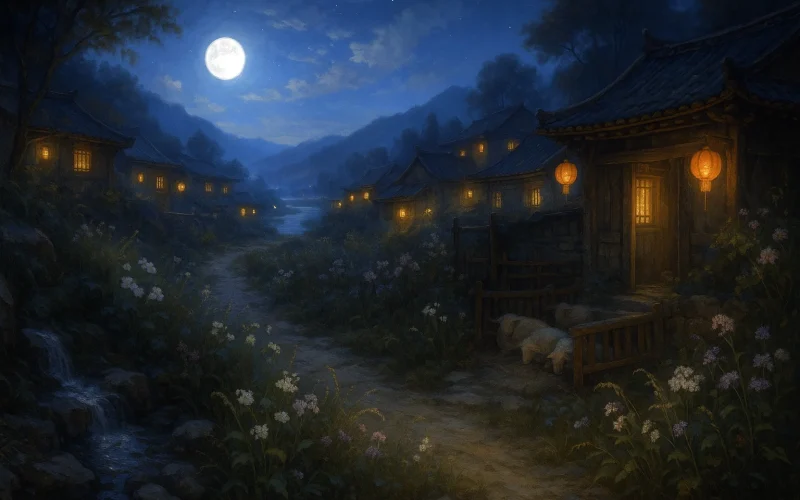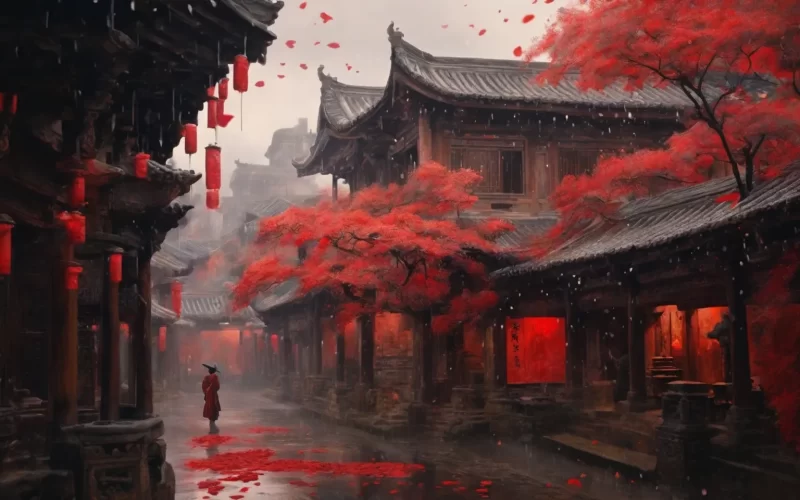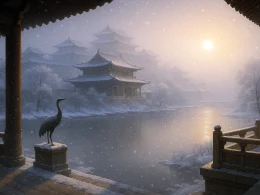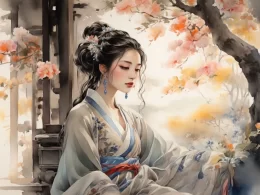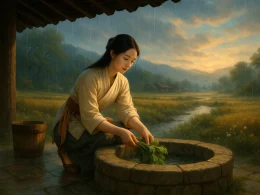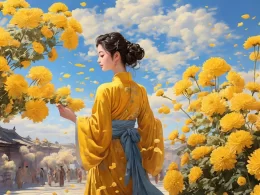The sheep and cattle come to rest,
All thatched gates closed east and west.
The gentle breeze and the moon bright
Remind me of homeland at night.
Among rocks flow fountains unseen;
Autumn drips dewdrops on grass green.
The candle brightens white-haired head.
Why should its flame blaze up so red?
Original Poem
「日暮」
杜甫
牛羊下来久,各已闭柴门。
风月自清夜,江山非故园。
石泉流暗壁,草露滴秋根。
头白灯明里,何须花烬繁。
Interpretation
This poem was composed in the autumn of 767 AD (the second year of the Dali era), during Du Fu's stay in Rangxi, Dongtun, Kuizhou (present-day Fengjie, Chongqing). At the time, Du Fu was nearly sixty years old, living a life of displacement amidst national turmoil, unable to return to his homeland, and burdened with deep-seated sorrow. Using the night scenery of a mountain village as a backdrop, the poem paints a tranquil yet desolate autumn night, expressing the poet's inner loneliness and indignation through the landscape.
First Couplet: "牛羊下来久,各已闭柴门。"
Niú yáng xià lái jiǔ, gè yǐ bì chái mén.
The cattle and sheep have long returned from the hills, and each household has closed its wooden gate.
These lines depict a peaceful and harmonious village scene. The livestock have returned to their pens, and the wooden gates of the homes are closed, creating an atmosphere of calm and serenity in the evening. However, the poet uses this tranquil setting to contrast his own inner loneliness. The word "long" (久, jiǔ) suggests the slow and leisurely return of the livestock, subtly hinting at the poet's own prolonged displacement and the uncertainty of ever returning home.
Second Couplet: "风月自清夜,江山非故园。"
Fēng yuè zì qīng yè, jiāng shān fēi gù yuán.
The clear night, with its gentle breeze and bright moon, is beautiful, but this land is not my homeland.
The poet shifts from the tranquil autumn night to express his longing for home. Though the night is serene and the landscape beautiful, they cannot dispel the poet's sorrow. The word "itself" (自, zì) conveys the poet's sense of isolation from the "clear night" and "beautiful land," while "not" (非, fēi) directly points to the pain of思念 (longing) for his homeland, expressing deep emotion with subtlety.
Third Couplet: "石泉流暗壁,草露滴秋根。"
Shí quán liú àn bì, cǎo lù dī qiū gēn.
The spring water flows quietly along the dark stone walls; dew drips from the roots of the grass.
Through delicate imagery, the poet captures the cold and somber atmosphere of the autumn night. The "flowing" of the spring and the "dripping" of the dew create faint, continuous sounds that seem to echo the poet's melancholic mood. This not only portrays the stillness and chill of the night but also reflects the poet's孤独 (loneliness).
Fourth Couplet: "头白灯明里,何须花烬繁。"
Tóu bái dēng míng lǐ, hé xū huā jìn fán.
My white hair is illuminated by the lamp's light; why should I care about the flickering of the lamp's wick?
The poet returns indoors, sitting alone by the lamp, his white hair starkly visible in the light. The频繁 (frequent) flickering of the lamp's wick goes unnoticed by the poet, as the phrase "why should I" (何须, hé xū) reveals the sorrow and frustration of old age, unfulfilled ambitions, and a career in decline. The lamp's flickering seems futile, contrasting with the poet's "white hair" to further emphasize the无奈 (helplessness) and sadness of his twilight years.
Overall Appreciation
On the surface, the poem describes a village nightscape, but it is deeply imbued with the poet's longing for home and his reflections on his own life. Through imagery such as dusk, the autumn night, the sound of springs, and the dripping of dew, the poet层层渲染 (gradually builds) a cold and desolate atmosphere, transitioning from calm to sorrow, and concluding with a personal lament. The structure is tightly woven, blending scene and emotion seamlessly. Though the poem never explicitly mentions思念 (longing) for home, it is permeated with a deep yearning for his homeland and the感慨 (reflections) of old age.
Writing Characteristics
- Vivid Imagery, Profound Atmosphere: The poem uses images such as "cattle and sheep," "wooden gates," "gentle breeze and bright moon," "flowing springs," and "dew on grass" to create a quiet and冷清 (desolate) atmosphere, setting the emotional tone for the poet's reflections.
- Scene and Emotion Intertwined, Subtle and Deep: The poet skillfully uses the landscape to express his emotions, reflecting his inner loneliness and sorrow through the tranquil autumn night. Though the language is understated, the emotions are profound and moving.
- Contrast and Juxtaposition, Emotional Progression: The poem contrasts the peace of "livestock returning" with the loneliness of "not my homeland," and the "white hair" with the "flickering lamp wick," deepening the poet's感慨 (reflections) on his漂泊 (wandering) life and unfulfilled ambitions.
Insights
This poem uses the tranquil nightscape of autumn to reflect the poet's inner loneliness and longing for home. Though far from his homeland, the poet's heart remains tied to it, showcasing his deep sense of家国情怀 (patriotism and love for home). Du Fu's poetry reminds us that even in difficult times, we should cherish the present and hold onto hope. Even in the twilight of life, the passion and信念 (beliefs) in our hearts are worth坚守 (holding onto).
Poem translator
Xu Yuan-chong (许渊冲)
About the poet

Du Fu (杜甫), 712 - 770 AD, was a great poet of the Tang Dynasty, known as the "Sage of Poetry". Born into a declining bureaucratic family, Du Fu had a rough life, and his turbulent and dislocated life made him keenly aware of the plight of the masses. Therefore, his poems were always closely related to the current affairs, reflecting the social life of that era in a more comprehensive way, with profound thoughts and a broad realm. In his poetic art, he was able to combine many styles, forming a unique style of "profound and thick", and becoming a great realist poet in the history of China.






